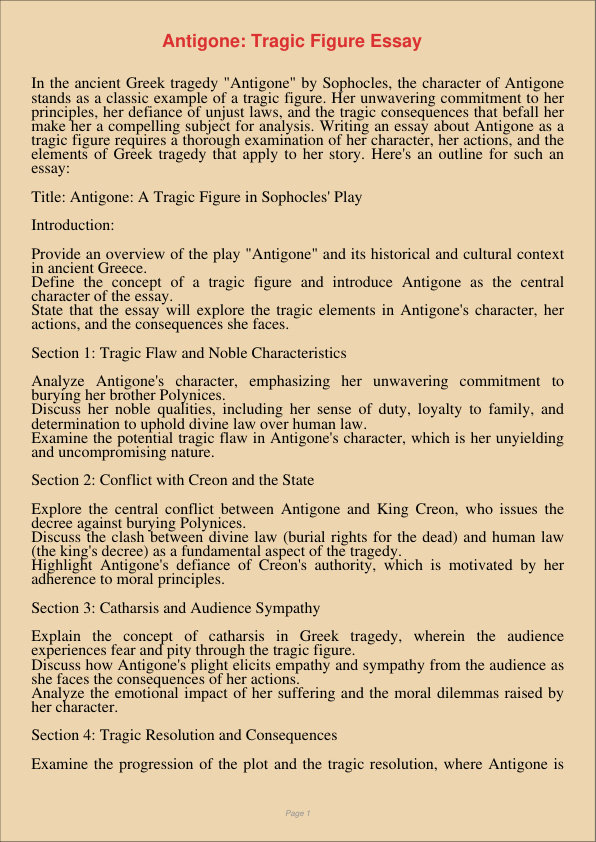In the ancient Greek tragedy “Antigone” by Sophocles, the character of Antigone stands as a classic example of a tragic figure. Her unwavering commitment to her principles, her defiance of unjust laws, and the tragic consequences that befall her make her a compelling subject for analysis. Writing an essay about Antigone as a tragic figure requires a thorough examination of her character, her actions, and the elements of Greek tragedy that apply to her story. Here’s an outline for such an essay:
Title: Antigone: A Tragic Figure in Sophocles’ Play
Introduction:
Provide an overview of the play “Antigone” and its historical and cultural context in ancient Greece. Define the concept of a tragic figure and introduce Antigone as the central character of the essay. State that the essay will explore the tragic elements in Antigone’s character, her actions, and the consequences she faces.
Section 1: Tragic Flaw and Noble Characteristics
Analyze Antigone’s character, emphasizing her unwavering commitment to burying her brother Polynices. Discuss her noble qualities, including her sense of duty, loyalty to family, and determination to uphold divine law over human law. Examine the potential tragic flaw in Antigone’s character, which is her unyielding and uncompromising nature.
Section 2: Conflict with Creon and the State
Explore the central conflict between Antigone and King Creon, who issues the decree against burying Polynices. Discuss the clash between divine law (burial rights for the dead) and human law (the king’s decree) as a fundamental aspect of the tragedy. Highlight Antigone’s defiance of Creon’s authority, which is motivated by her adherence to moral principles.
Section 3: Catharsis and Audience Sympathy
Explain the concept of catharsis in Greek tragedy, wherein the audience experiences fear and pity through the tragic figure. Discuss how Antigone’s plight elicits empathy and sympathy from the audience as she faces the consequences of her actions. Analyze the emotional impact of her suffering and the moral dilemmas raised by her character.
Section 4: Tragic Resolution and Consequences
Examine the progression of the plot and the tragic resolution, where Antigone is entombed alive. Discuss the ultimate tragedy that befalls Antigone as she faces her mortality, isolated in a tomb. Highlight the broader implications of her sacrifice for the city of Thebes and her family.
Section 5: Lessons and Themes
Explore the enduring themes of “Antigone,” such as the conflict between individual conscience and state authority, the consequences of pride and hubris, and the impact of fate. Discuss the moral and ethical lessons that can be drawn from the play through the character of Antigone. Reflect on the universality and relevance of these themes in contemporary society.
Conclusion:
Summarize the key elements that make Antigone a tragic figure, including her character, her conflict with Creon, and the consequences of her actions. Emphasize the enduring impact of Antigone’s story and the insights it offers into the human condition. Encourage reflection on the enduring appeal of Greek tragedy and the complexities of moral and ethical dilemmas that continue to resonate with audiences.
References:
Cite the play “Antigone” by Sophocles and relevant critical analyses or scholarly works.
This essay should provide a comprehensive analysis of Antigone as a tragic figure in Sophocles’ play, highlighting her character traits, her tragic flaw, her conflict with authority, and the enduring themes and lessons her story imparts to audiences.

「真诚赞赏,手留余香」
真诚赞赏,手留余香
使用微信扫描二维码完成支付
